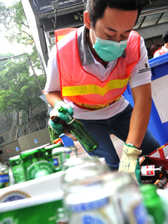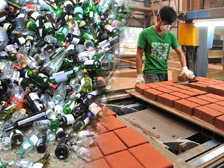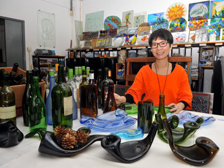
Towards a greener future:
Hui Yuk-po leads a Hong Chi Association team that collects waste bottles from the Minden Avenue bar zone in Tsim Sha Tsui.
Towards a greener future:
Hui Yuk-po leads a Hong Chi Association team that collects waste bottles from the Minden Avenue bar zone in Tsim Sha Tsui.

Waste reduction:
Producing just one square metre of eco-paver requires 20kg of waste glass and 50kg of construction waste.
Waste reduction:
Producing just one square metre of eco-paver requires 20kg of waste glass and 50kg of construction waste.

Glass master:
Fiona Wong learned how to cut bottles by hand and melt and reshape them using high temperatures to create novel handicrafts.
Glass master:
Fiona Wong learned how to cut bottles by hand and melt and reshape them using high temperatures to create novel handicrafts.
Glass action paves way to greener HK
April 07, 2013
Hours after the rowdy bar crawlers have downed their last drinks, you will find Hui Yuk-po and his team carefully, quietly plucking up empty glass bottles and setting them into large recycling bins. Diverted from the overflowing landfills, the bottles will instead be used to pave the way to a greener Hong Kong.
About 250 tonnes of empty glass bottles are disposed of at landfills every day in Hong Kong - roughly equivalent to half a million 750ml bottles. Glass does not naturally decompose, and our landfills are almost at capacity. So the Government has urgently been looking for ways to reduce, re-use and recycle glass waste.
It now supports five glass-recycling programmes, with financial support through the Environmental & Conservation Fund and technical advice from the Environmental Protection Department. The Hong Chi Association, a non-profit organisation serving those with intellectual disabilities, operates the recycling programme that employs Mr Hui and about 100 other trainees.
At 8am on a recent Monday morning,
news.gov.hk spoke with Mr Hui as he began work at the bar zone on Minden Avenue in Tsim Sha Tsui, wearing a reflective vest and a pair of safety gloves. He is in his third year of working for the recycling team, and was promoted to team leader.
Empty beer bottles filled dozens of cartons along the street. Instead of pouring them from the cartons into the recycling bins, Mr Hui and his teammates pick them up and set them in one by one to avoid making too much noise and disturbing the residents nearby.
When they finish at Minden Avenue, the team will move on to other collection points. Hong Chi’s programme covers about 160 such points, including private housing estates, commercial organisations, non-governmental organisations, government departments and Hong Chi’s own service centres.
The job demands intensive manual labour, from 8am to 5pm, Mondays to Saturdays. Still, Mr Hui is enthusiastic about his work, which he considers a labour of love.
“Because I can help protect the environment. I didn’t release that I could do that before,” he said.
In its first three years of operating the programme, Hong Chi has collected more than 1,000 tonnes of glass bottles for recycling. It now hopes to double this quantity.
Environmentally friendly path
Most of the recycled glass bottles in the city are supplied to two local paving block manufacturers. A machine crushes the glass into glass sand, which can be used as a river-sand substitute, then mixed with cement and construction waste to produce so-called eco-pavers.
To make one square metre of eco-paver takes 20kg of waste glass bottles and 50kg of construction waste. This greatly reduces the burden on local landfills and the demand for other construction materials, such as river sand. The dredging work required to extract river sand damages the river bed and its ecological system.
Unlike the production of regular pavement, the eco-paver manufacturing process does not require treatment at high temperature as the eco-pavers are cured through natural air drying. This helps reduce carbon emissions.
Compared with conventional paving blocks, eco-pavers weigh less and absorb less water. Titanium dioxide can be added to the top layer to help remove nitrogen oxide air pollutants.
The Highways Department, Civil Engineering & Development Department, Architectural Services Department, Hong Kong Housing Authority, Environmental Protection Department and local tertiary institutes have all used such eco-paving blocks in construction projects.
Dixon Chan, managing director for a local eco-paver manufacturer, said now that the Government is actively promoting glass-bottle recycling and the industry needs to explore more feasible waste-glass applications.
“Besides eco-pavers, we can also use waste glass to make partition blocks and road kerbs,” he said.
Trash to treasure
Outside the construction industry, recycled glass is also attracting attention from the creative industry. For local artist Fiona Wong, a used glass bottle is akin to a sculptor’s clay or a painter’s canvas.
“I do not see these glass bottles as trash. Glass itself is a very interesting material,” Miss Wong said.
She has mastered the skills of hand-cutting glass bottles and using high temperature to melt and reform them into different shapes to craft items such as candle holders, business-card stands, food trays, and an innovative table stand for smartphones and tablets.
She collects waste glass bottles from hotels, restaurants and friends, and takes her own empty bottles home when she dines out.
To promote glass-bottle recycling, the Environment Bureau has launched a
public consultation on implementing a producer-responsibility scheme. It ends on May 6. The Government believes that 70% of glass bottles could be recovered under the scheme, alleviating pressure on landfills.